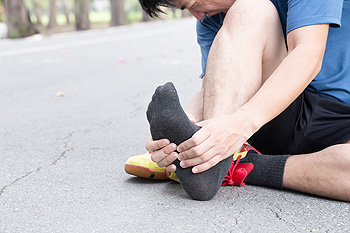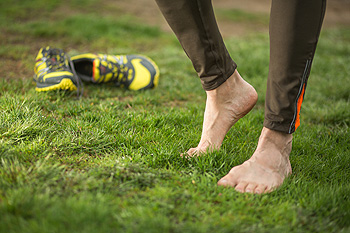Foot and Ankle Specialist
May 2019
Edema and Pregnancy
Many pregnant women notice their feet have become swollen. This is caused by the pressure that is put on the lower limbs, which is often the result of a growing fetus. The medical term for excessive swelling is referred to as edema, and is a common ailment in a large percentage of pregnant women. It is beneficial to wear shoes that are comfortable, and elevating the legs frequently during the day may bring mild relief. Additionally, the feet may swell as a result of high blood pressure. Research has shown if one foot becomes swollen, it may be indicative of an existing medical condition. If you would like additional information about how pregnancy affects the feet, it is suggested that you schedule a consultation with a podiatrist.
Pregnant women with swollen feet can be treated with a variety of different methods that are readily available. For more information about other cures for swollen feet during pregnancy, consult with Don A. Shumway, DPM from Arizona. Our doctor will attend to all of your foot and ankle needs.
What Foot Problems Can Arise During Pregnancy?
One problem that can occur is overpronation, which occurs when the arch of the foot flattens and tends to roll inward. This can cause pain and discomfort in your heels while you’re walking or even just standing up, trying to support your baby.
Another problem is edema, or swelling in the extremities. This often affects the feet during pregnancy but tends to occur in the later stages.
How Can I Keep My Feet Healthy During Pregnancy?
- Wearing orthotics can provide extra support for the feet and help distribute weight evenly
- Minimize the amount of time spent walking barefoot
- Wear shoes with good arch support
- Wear shoes that allow for good circulation to the feet
- Elevate feet if you experience swelling
- Massage your feet
- Get regular, light exercise, such as walking, to promote blood circulation to the feet
If you have any questions please feel free to contact our office located in Snowflake, AZ . We offer the newest diagnostic and treatment technologies for all your foot and ankle needs.
Read more about Pregnancy and Foot HealthTypes of Running Injuries
Research has indicated that many runners get injured every year. Running injuries can be prevented when properly fitted shoes are worn, and stretching techniques are implemented. A common injury is referred to as Achilles tendinitis, which is typically caused by tight calf muscles. The Achilles tendon can be strengthened by performing heel raises several times before running. If you have plantar fasciitis, you are most likely familiar with the pain that exists in the heel of the foot. Mild relief may be found when the plantar fascia is properly stretched. This is accomplished by pulling your toes gently away from your foot, in addition to rolling the bottom of your foot on a frozen water bottle or tennis ball. If you would like more information about how to prevent running injuries, it is suggested that you counsel with a podiatrist.
Exercising your feet regularly with the proper foot wear is a great way to prevent injuries. If you have any concerns about your feet, contact Don A. Shumway, DPM of Arizona. Our doctor will treat your foot and ankle needs.
How to Prevent Running Injuries
Many common running injuries are caused by overuse and overtraining. When the back of the kneecap starts wearing out and starts causing pain in your knee, this is commonly referred to as runner’s knee. Runner’s knee is a decrease in strength in your quadriceps and can occur if you’re not wearing properly fitted or supporting shoes. To prevent runner’s knee, focusing on hip strengthening is a good idea, as well as strengthening your quads to keep the kneecaps aligned.
What Are Some Causes of Running Injuries?
- One cause of a common running injury is called iliotibial band syndrome.
- Plantar fasciitis is also another common injury.
- Stress fractures can occur from overtraining, lack of calcium, or even your running style.
Best Ways to Prevent Running Injuries
- Wear footwear that fits properly and suits your running needs.
- Running shoes are the only protective gear that runners have to safeguard them from injury.
- Make a training schedule. Adding strengthening exercises as well as regular stretching can help keep you strong and limber and can lessen the possibility of injuries.
- Stretching keeps muscles limber; this will help you gain better flexibility.
If you have any questions please feel free to contact our office located in Snowflake, AZ . We offer the newest diagnostic and treatment technologies for all your foot and ankle needs.
Read more about How to Prevent Running InjuriesHow Can My Feet Feel Better with Plantar Fasciitis?
 The plantar fascia is known as the tendon on the sole of the foot that connects the heel to the toes. If this should become inflamed as a result of an injury or overuse, a condition that is referred to plantar fasciitis may develop. The pain is typically felt in the arch or heel area of the foot, and walking may be difficult. There are several stretches that can be performed which can relieve a portion of the pain. These include calf stretches which can be accomplished by standing on a step and dropping one heel at a time so a stretch can be felt. Rolling your heel on a round object can aid in loosening the foot muscles. Additionally, it helps the foot to stretch when the toes are pointed and flexed. If you suffer from plantar fasciitis, it is strongly suggested that you schedule a consultation with a podiatrist who can properly treat this condition.
The plantar fascia is known as the tendon on the sole of the foot that connects the heel to the toes. If this should become inflamed as a result of an injury or overuse, a condition that is referred to plantar fasciitis may develop. The pain is typically felt in the arch or heel area of the foot, and walking may be difficult. There are several stretches that can be performed which can relieve a portion of the pain. These include calf stretches which can be accomplished by standing on a step and dropping one heel at a time so a stretch can be felt. Rolling your heel on a round object can aid in loosening the foot muscles. Additionally, it helps the foot to stretch when the toes are pointed and flexed. If you suffer from plantar fasciitis, it is strongly suggested that you schedule a consultation with a podiatrist who can properly treat this condition.
Plantar fasciitis can be very painful and inconvenient. If you are experiencing heel pain or symptoms of plantar fasciitis, contact Don A. Shumway, DPM from Arizona. Our doctor can provide the care you need to keep you pain-free and on your feet.
What Is Plantar Fasciitis?
Plantar fasciitis is the inflammation of the thick band of tissue that runs along the bottom of your foot, known as the plantar fascia, and causes mild to severe heel pain.
What Causes Plantar Fasciitis?
- Excessive running
- Non-supportive shoes
- Overpronation
- Repeated stretching and tearing of the plantar fascia
How Can It Be Treated?
- Conservative measures – anti-inflammatories, ice packs, stretching exercises, physical therapy, orthotic devices
- Shockwave therapy – sound waves are sent to the affected area to facilitate healing and are usually used for chronic cases of plantar fasciitis
- Surgery – usually only used as a last resort when all else fails. The plantar fascia can be surgically detached from the heel
While very treatable, plantar fasciitis is definitely not something that should be ignored. Especially in severe cases, speaking to your doctor right away is highly recommended to avoid complications and severe heel pain. Your podiatrist can work with you to provide the appropriate treatment options tailored to your condition.
If you have any questions please feel free to contact our office located in Snowflake, AZ . We offer the newest diagnostic and treatment technologies for all your foot and ankle needs.
Read more about Plantar FasciitisAre You Suffering From Ingrown Toenails?
What Causes Plantar Hyperhidrosis?
 The medical condition that is known as plantar hyperhidrosis refers to excessive sweating of the feet. There are several external reasons why this ailment may occur. These include hot and humid weather, eating spicy foods, and performing strenuous exercise routines. Research has shown that existing medical conditions can contribute to the onset of plantar hyperhidrosis. These may consist of menopause, low blood sugar, and thyroid disorders. Mild relief may be found when deodorant is applied to the feet before bed and wearing socks and shoes that are made of breathable materials. If you are suffering from this condition, it is suggested that you schedule a consultation with a podiatrist who can properly treat this ailment.
The medical condition that is known as plantar hyperhidrosis refers to excessive sweating of the feet. There are several external reasons why this ailment may occur. These include hot and humid weather, eating spicy foods, and performing strenuous exercise routines. Research has shown that existing medical conditions can contribute to the onset of plantar hyperhidrosis. These may consist of menopause, low blood sugar, and thyroid disorders. Mild relief may be found when deodorant is applied to the feet before bed and wearing socks and shoes that are made of breathable materials. If you are suffering from this condition, it is suggested that you schedule a consultation with a podiatrist who can properly treat this ailment.
If you are suffering from hyperhidrosis contact Don A. Shumway, DPM of Arizona. Our doctor can provide the care you need to attend to all of your foot and ankle needs.
Hyperhidrosis of the Feet
Hyperhidrosis is a rare disorder that can cause people to have excessive sweating of their feet. This can usually occur all on its own without rigorous activity involved. People who suffer from hyperhidrosis may also experience sweaty palms.
Although it is said that sweating is a healthy process meant to cool down the body temperature and to maintain a proper internal temperature, hyperhidrosis may prove to be a huge hindrance on a person’s everyday life.
Plantar hyperhidrosis is considered to be the main form of hyperhidrosis. Secondary hyperhidrosis can refer to sweating that occurs in areas other than the feet or hands and armpits. Often this may be a sign of it being related to another medical condition such as menopause, hyperthyroidism and even Parkinson’s disease.
In order to alleviate this condition, it is important to see your doctor so that they may prescribe the necessary medications so that you can begin to live a normal life again. If this is left untreated, it is said that it will persist throughout an individual’s life.
A last resort approach would be surgery, but it is best to speak with your doctor to find out what may be the best treatment for you.
If you have any questions please feel free to contact our office located in Snowflake, AZ . We offer the newest diagnostic and treatment technologies for all your foot and ankle needs.
Read more about Hyperhidrosis of the Feet








